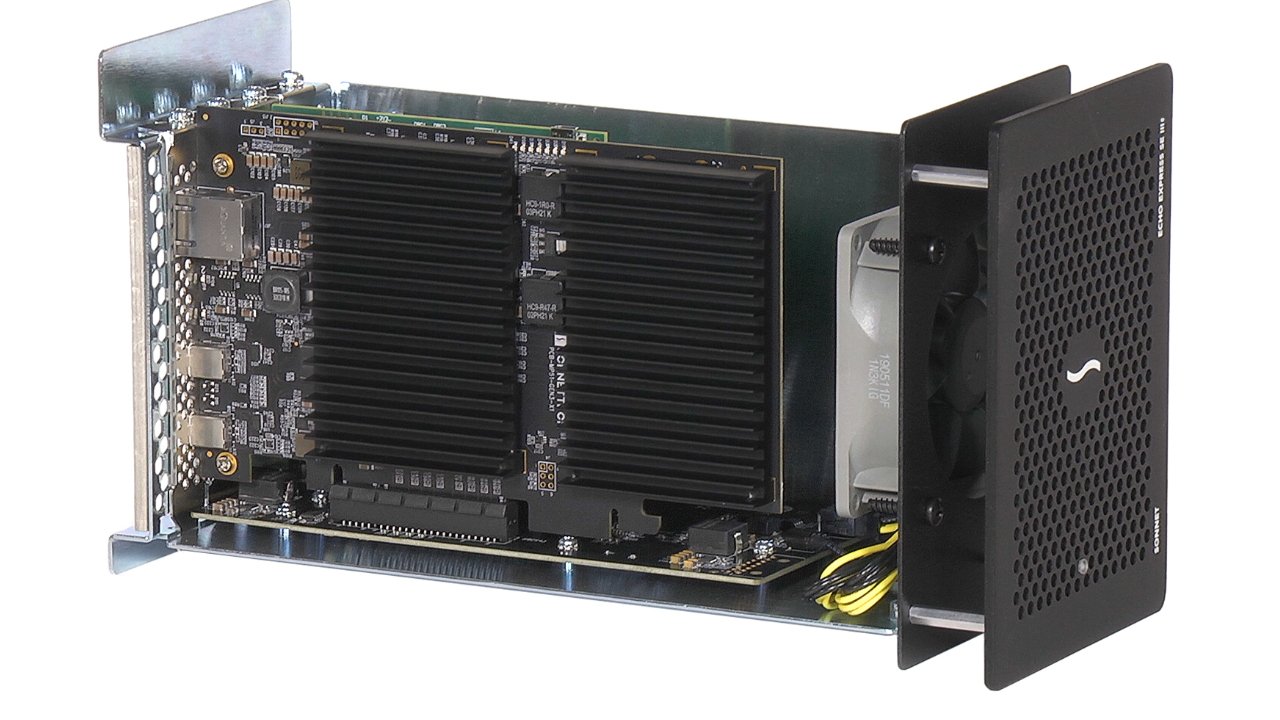Sonnet introduces McFiver PCIe card with 10-gig ethernet, USB-C, SSD slots
The new Sonnet McFiver brings internal SSD storage, 10 Gigabit Ethernet, 10Gbps USB-C, and two SSD slots for high-speed storage in a single PCIe card for the Mac Pro or any Mac with an PCI-E enclosure.

Sonnet has long provided systems with PCIe slots, and computer adapter cards, but now the new McFiver offers five interfaces in a single full-height PCIe card that requires no external power.
"For most creators, the ability to move files quickly -- whether to or from onboard storage, across a network, or to or from external drives -- can be critical to their workflows," says the company in a statement. "While individual adapter cards may offer the capability to speed up one part of the workflow, installing three adapter cards to get all the interfaces a user needs may not be feasible, even in computers with multiple expansion card slots."
The five interfaces in the McFiver are:
When placed directly into a system such as a Mac Pro, using its PCIe 3.0 or 4.0 card slot, Sonnet claims that "a single NVMe PCIe SSD installed on the card can deliver data transfers up to 3,400 MB/s."
For every other Mac, and any computer that has no PCIe card slots, the McFiver can be installed in a separate Sonnet system, or a leftover eGPU enclosure. The company's Echo Thunderbolt to PCIe card expansion system brings "the McFiver card's interfaces through a single cable" to the Mac Studio, MacBook Pro, iMac, and more. Total bandwidth available to the card will be limited by Thunderbolt speeds.
The McFiver will be available from Sonnet from the second week of June. It will retail for $399.99.
Read on AppleInsider

Sonnet has long provided systems with PCIe slots, and computer adapter cards, but now the new McFiver offers five interfaces in a single full-height PCIe card that requires no external power.
"For most creators, the ability to move files quickly -- whether to or from onboard storage, across a network, or to or from external drives -- can be critical to their workflows," says the company in a statement. "While individual adapter cards may offer the capability to speed up one part of the workflow, installing three adapter cards to get all the interfaces a user needs may not be feasible, even in computers with multiple expansion card slots."
The five interfaces in the McFiver are:
- 10 gigabit Ethernet (10GbE)
- Two 10 gigabit per second USB-C ports
- Two slots for single- or double-sided M.2 NVMe 2280 PCIe SSDs
When placed directly into a system such as a Mac Pro, using its PCIe 3.0 or 4.0 card slot, Sonnet claims that "a single NVMe PCIe SSD installed on the card can deliver data transfers up to 3,400 MB/s."
For every other Mac, and any computer that has no PCIe card slots, the McFiver can be installed in a separate Sonnet system, or a leftover eGPU enclosure. The company's Echo Thunderbolt to PCIe card expansion system brings "the McFiver card's interfaces through a single cable" to the Mac Studio, MacBook Pro, iMac, and more. Total bandwidth available to the card will be limited by Thunderbolt speeds.
The McFiver will be available from Sonnet from the second week of June. It will retail for $399.99.
Read on AppleInsider

Comments
It was definitely not designed for the old old Mac Pro but rather as a budget option for single-slot Thunderbolt enclosures to upgrade Mac Minis etc without taking up all their TB ports, and for PCs with few PCIe slots available. On the PC side this could give new life to a lot of older machines that don’t have Thunderbolt ports for a TB dock. Like the old HP mini tower I tinkered with turning into a TrueNAS 10GbE server. Really cool combination of useful upgrades in one card for a pretty reasonable price actually! I only wish they’d given it a x16 PCIe connection for maximum speed with older PCIe 2.0 machines.
There are board assembly houses which basically do for circuit boards what print-on-demand companies do for books. They're more expensive per-unit than a bulk order of a thousand units, but you don't have to deal with inventory. At that point, addressable market size doesn't matter all that much.